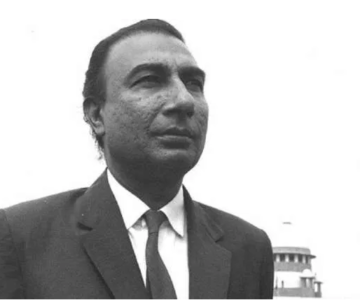By Nadir Ali
A little over fifty years ago our Persian teacher, a pious maulana in the old mould, was explaining the exemplary character of the Holy Prophet (pbuh). He quoted lines from Baaba Naanak to explain his point ‘Ek ne keh di ek ne maani’. This was not uncommon. From great Punjabi poet Hafiz Burkhurdar (17th century) to a common Punjabi villager, everyone quoted Naanak. Now they teach no Naanak at Punjab University Lahore, because Naanak was a non-Muslim.
However in Muzaffar Ghaffar’s series on Punjabi classic poetry, you get an insight into the great wisdom and beauty of Naanak’s poetry. Muzaffar is a great cultural asset and in presenting a selection of Naanak after seven volumes in this remarkable series on Sufi poetry of Shah Husayn, Bulleh Shah, Sachal Sarmast and Khawaja Farid, he has excelled himself in this one. His series presenting all the major poets of Punjabi language in English is a work unique not only in the subcontinent but among world literature. In no other language are all the major poets of a language explained so comprehensively and competently by one author. Punjabi has a very rich heritage and Muzaffar has done justice to this colossal undertaking.
I have had an occasion to read most of his works. He has his own point of view in interpretation and you cannot blame him for that, and this he eloquently explains at length. But he does point out all other possibilities and interpretations also. In Naanak’s poetry, he has shown greater restraint, keeping in view the Sikh sensitivities, as this is their Holy Book. The result is even better — more pithy and succinct and yet doing full justice to the task. I have read a few books on Naanak’s poetry published in India as well as in Pakistan, US and Britain. None matches Muzaffar’s work in the universality of interpretation. Prof. Kishen Singh’s book giving a modern Marxist explanation of Naanak and books of orthodox religious explanations of Naanak are voluminous and complex; but those are in a different category.
This selection giving some compositions in full and some in part; 52 pieces out of a total of six hundred odd compositions of Baba Naanak in the Granth Sahib are a very representative selection. In this book the criteria for selection was to go for those compositions which have easier idiom in the original, are less Sanskritised and deal with more universal themes. However, no part of a holy book can be considered inferior. This discretion in selection and the treatment make it a gem of a book.
Muzaffar’s triumph is all the more remarkable because he had no encouragement or help from any quarter. Behind this series is fifteen years of tremendous hard work and study. His facility with the English idiom is a great asset. I am against translations in verse. But Muzaffar’s work is as close to the original as any medium could be. Here are extracts from two of my favorite pieces , to give the reader a flavor of the work.
Jooth na raageen jooth na
vedeen
Jooth na chun sooraj ki
bhedeen
Jooth na unneen jooth na
naayeen
Jooth na meenh waray sabh
thayeen
Defilement not in musical modes, defilement not in true learning
Defilement not in moon’s and sun’s mysterious separating defilement not in water defilement not in grain
Defilement none when everywhere there’s rain.
Jooth — defilement according to Hindu upper class belief — is caused by someone of a lower caste touching or partaking of a food item. But the root is same as Jhooth — falsehood. Naanak explains how nature’s order/truth, an equal bounty for all, is turned into falsehood by our dealings. Look at the condemnation of power which is every mortal’s favourite bride.
Aakhan jor chupe na jor
jor na mangan den na jor
jor na jeevan maran na jor
jor na raj maal manshor
Speaking is not power, silence not power
Power not asking, giving not power
Power not life, dying not power
Power not rule, wealth, charter
Jor, power, as well as coercion is again not nature’s order. It costs nothing to speak gently or listen patiently. And living and dying are nature’s phenomenon. But power, rule, wealth and charter has distorted this natural harmony. Naanak does not approve of this order.
A project of giant proportions, this work would have a thriving market in India, where a larger English readership exists and there is a respect of things academic. Hundreds of departments of South Asian languages will lap up this collection.
This book has a comprehensive introduction to Punjabi Sufi poetry and a short biography and note on Naanak’s work and the printing quality is superb.
Each composition has been printed in Urdu/Nastaliq script, in Gurmukhi as well as a Romanised version for the English readers. Each composition is followed by a glossary of difficult words with all shades of meanings, an English, line by line translation in verse, followed by a comprehensive explanation/interpretation.
Baaba Naanak
Author Muzaffar Ghaffar
Published by Ferozesons Lahore, 2007
Pages: 435
Price: Rs 1095/-



